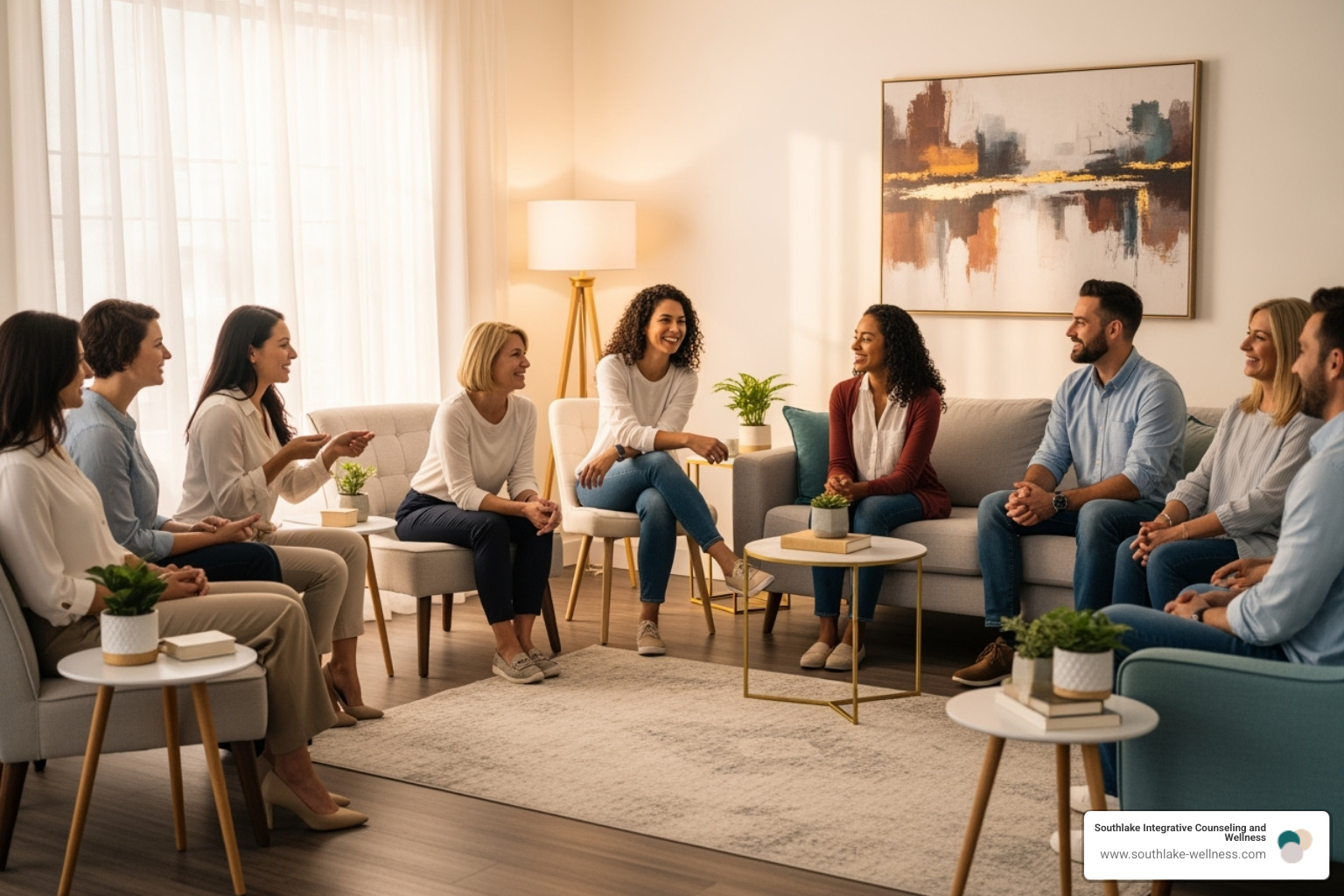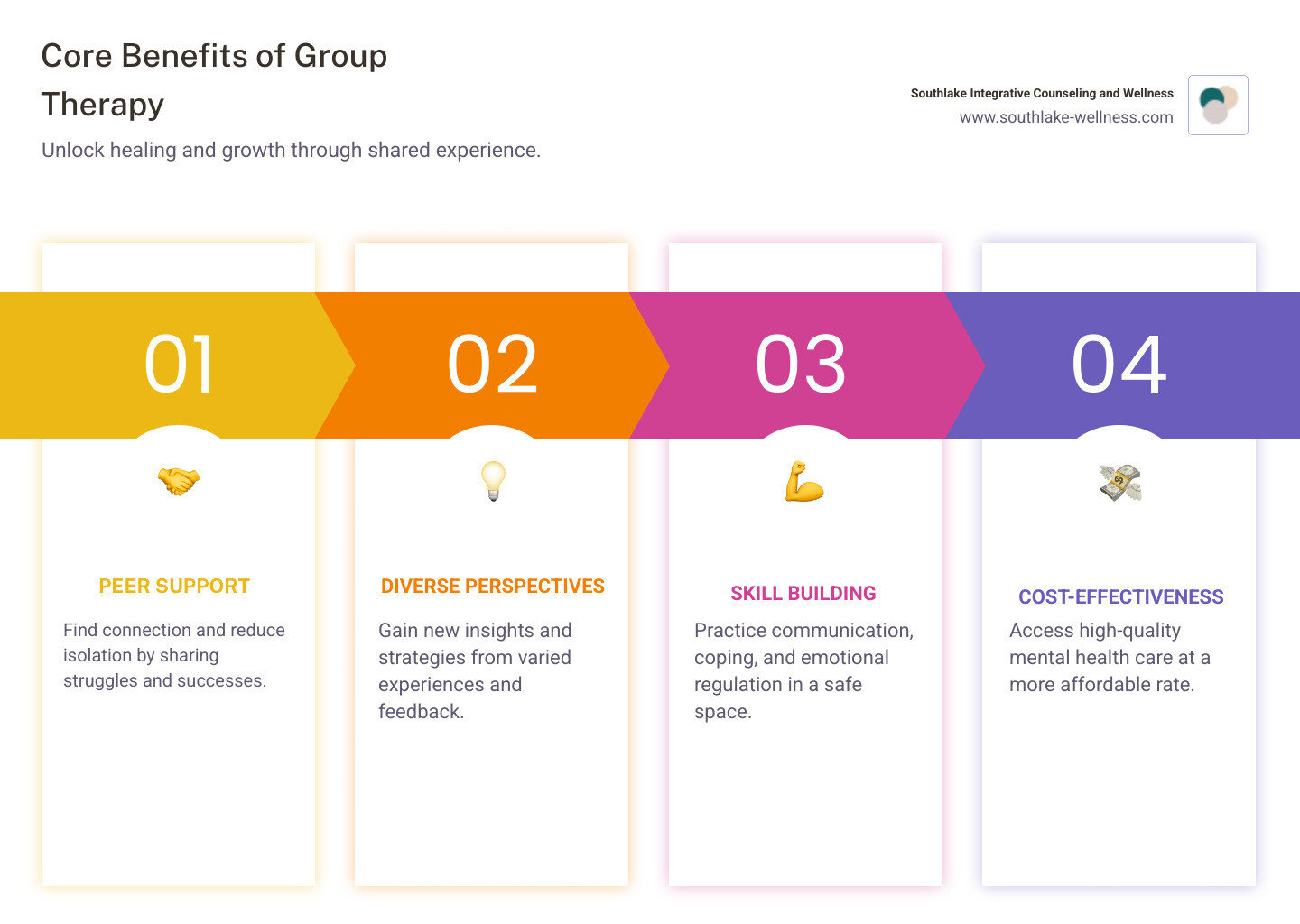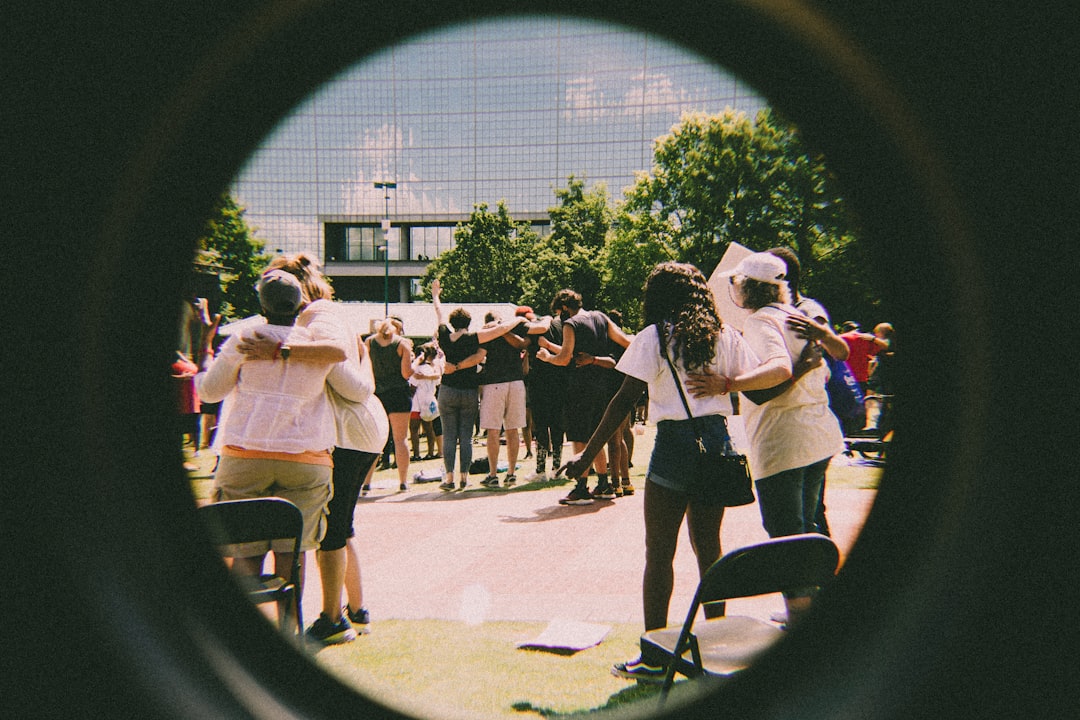
Why Fun Matters in Group Therapy
Fun mental health group therapy activities for adults are more than just entertainment; they are powerful tools for healing, connection, and growth. Engaging activities create a relaxed environment where therapeutic concepts are absorbed more naturally.
Top Fun Mental Health Group Therapy Activities:
- Icebreakers: Two Truths and a Lie, Human Bingo, Desert Island Questions
- Creative Expression: Group Murals, Draw Your Mood, Vision Boards
- Trust-Building: Human Knot, Mirror Activity, Blindfolded Obstacle Course
- Mindfulness: Body Scan Meditation, Five Senses Activity, Mindful Coloring
- CBT-Based: Thought Replacement, Behavioral Activation
- Emotional Skills: Wheel of Emotions, Role-Playing Scenarios, Empathy Bingo
Group therapy thrives on the power of shared experience. It dissolves the isolation many feel, as Dr. Irvin D. Yalom noted, by showing participants they are not alone in their struggles. This shared understanding is transformative.
The benefits are significant. Research confirms group therapy is effective for treating depression, and it's more affordable than individual therapy, increasing access to care. Members learn from one another, practice new skills, and build accountability.
With many adults facing anxiety and depression, group therapy offers a solution to common barriers like cost and stigma. Fun activities reduce stress, boost motivation, and create positive associations with the healing process. These exercises help adults express difficult emotions, build trust, and develop practical coping skills.
As a therapist with 14 years of clinical experience, I've seen how fun mental health group therapy activities for adults can transform lives. By blending evidence-based methods with interactive exercises, we make healing feel less daunting and more empowering.

Setting the Stage: Creating a Safe and Engaging Space
Creating a safe and engaging environment is crucial before starting any fun mental health group therapy activities for adults. When people feel respected and welcome, the real work can begin.
Establishing group rules collaboratively gives participants ownership of the space. The cornerstone is confidentiality: what's shared in the group stays in the group. We also emphasize active listening without judgment and punctuality to respect everyone's time.
The facilitator's role is to ensure every voice is heard, manage group dynamics, and constructively handle conflicts. This requires redirecting dominant speakers, encouraging quieter members, and maintaining a neutral, supportive stance. You can read more about our approach to facilitating a group session on our blog.
Tailoring activities to group needs is key. A group for workplace stress will have different needs than one for grief. We consider the members' backgrounds, challenges, and goals to select the most appropriate activities, whether it's art therapy for emotional expression or a CBT exercise for reframing thoughts.
Adapting for online therapy is also important. A 2022 study confirmed that online group sessions can effectively reduce anxiety and improve self-esteem. We use digital tools like breakout rooms and whiteboards to keep virtual sessions engaging and ensure the healing is just as real.
Finally, evaluating progress through feedback and observation helps us refine our approach. By tracking participation, openness, and skill application, we ensure the group is meeting its therapeutic goals and evolving with the members' journeys.
Let's Get Started: Icebreakers and Trust-Building Exercises
Walking into group therapy can be nerve-wracking. Icebreakers and trust-building exercises are essential fun mental health group therapy activities for adults because they transform that nervous energy into connection. These opening activities break down barriers, reduce social anxiety, and create a playful, low-pressure atmosphere where real therapeutic work can begin. Building rapport creates the foundation of vulnerability and trust that makes group therapy so powerful.

Fun Icebreaker Activities for Adult Groups
- Two Truths and a Lie: Each person shares three “facts” about themselves—two true, one false. The group guesses the lie, revealing surprising and humanizing details about each other.
- Human Bingo: Participants mingle to find others who match squares on a bingo card (e.g., “plays an instrument,” “is a morning person”). It’s a great way to spark conversation and find common ground.
- Strengths-Based Introductions: Instead of focusing on problems, members introduce themselves by sharing a personal strength. This shifts the group’s energy toward hope and capability.
- Desert Island Questions: Asking what three items someone would bring to a desert island reveals their values and priorities in a lighthearted way.
Building a Foundation of Trust
Once members are comfortable, we can deepen connections with activities that require more cooperation and vulnerability.
- The Human Knot: A physical puzzle where the group must untangle themselves from a knot of arms without letting go. It’s a metaphor for navigating complex relationships and requires communication, patience, and teamwork.
- The Mirror Activity: In pairs, one person mirrors the other’s slow movements without speaking. This silent exercise builds empathy and a powerful sense of attunement.
- Shared Positive Experiences: Members share a story of resilience or hope, reminding the group of their inner strength and shared humanity.
- Blindfolded Obstacle Course: One person is blindfolded while their partner verbally guides them through a simple course. It’s a profound exercise in vulnerability, trust, and interdependence that opens doors to deeper therapeutic conversations.
To learn more about creating these kinds of effective group settings, explore More info on small group counseling.
Diving Deeper: Fun Mental Health Group Therapy Activities for Adults
Once trust is established, fun mental health group therapy activities for adults help members express complex emotions, develop life skills, and achieve self-findy in an engaging way.

Creative and Fun Mental Health Group Therapy Activities for Adults
Creative expression can voice feelings that are too deep for words. Art therapy techniques allow people to communicate what's inside without needing to find the “right” words.
- Group Murals: The group collaborates on a large canvas, blending perspectives and creating a tangible representation of their collective experience.
- Draw Your Mood: Participants visually capture their current feelings without words. Sharing the drawings builds empathy and normalizes emotional experiences.
- Vision Boards: Members create collages representing their goals and dreams, clarifying values and giving hope a visual form.
- Music and Movement: Using music to inspire free-form movement or creating a shared playlist helps release physical tension and access emotions that talk therapy may not reach.
- Expressive Journal Writing: Prompts like “Write a letter to your younger self” encourage exploration through a mix of writing and drawing in a private journal.
Skill-Building with CBT and Mindfulness
Cognitive Behavioral Therapy (CBT) and mindfulness provide practical tools to manage your inner world. In a group, members learn from each other and practice skills in real-time.
- Thought Replacement (CBT): The group works together to identify and challenge negative automatic thoughts, brainstorming more balanced and realistic alternatives.
- Behavioral Activation (CBT): Members identify enjoyable activities they've stopped doing and create a concrete plan to re-engage, with the group providing accountability.
- Body Scan Meditation: A guided meditation that brings awareness to physical sensations, helping to release tension and strengthen the mind-body connection.
- The Five Senses Activity: A grounding technique that anchors participants in the present by having them notice things they can see, feel, hear, smell, and taste.
- Mindful Coloring: Focusing on coloring intricate designs like mandalas calms the nervous system and quiets racing thoughts.
Explore more info on mindfulness-based group therapy on our blog.
Activities for Emotional Regulation and Life Skills
These activities bridge the gap between understanding emotions and managing them effectively.
- Wheel of Emotions: Using a chart of nuanced emotions, participants identify their current feelings, helping to expand emotional vocabulary and recognize patterns.
- Role-Playing Scenarios: Members practice navigating challenging situations (e.g., setting boundaries) in a safe space, building confidence for real-life interactions.
- The "I am" Activity: Each person completes the sentence “I am…” with positive affirmations, reinforcing a positive self-perception with peer support.
- Empathy Bingo: An interactive game that helps members recognize shared experiences, developing empathy and self-compassion.
These activities contribute to emotional wellness, which you can learn more about through more info on emotional wellness counseling.
Wrapping Up and Looking Forward
How a group therapy session ends is just as important as the work done during it. Closing activities are not just about saying goodbye; they are about reinforcing learning, encouraging continued practice, and providing closure that honors each person's progress. These final moments bridge the gap between the group experience and everyday life, helping to turn insights into lasting change.

Effective Closing Activities for Group Sessions
- Gratitude Jar: At the end of each session, members write down something they're grateful for and add it to a jar. Reading them aloud periodically shifts focus to the positive and celebrates progress.
- Take-Home Affirmations: Each person shares a key takeaway or affirmation to hold onto. Writing it on a card creates a tangible reminder of the group's support and insights.
- Group Motto Creation: A collaborative activity where the group creates a motto that captures their shared journey and resilience, serving as a lasting reminder of their collective strength.
- Circle of Support: Standing in a circle, each person shares how they feel supported by the group. This highlights the deep connections formed and reinforces the power of peer support.
These rituals help participants internalize their growth and feel prepared to continue their healing journey. For more strategies, explore More info on closing a group session.
Frequently Asked Questions about Fun Group Therapy Activities
Here are answers to common questions about making group therapy more engaging and effective.
How do you make group therapy more engaging for adults?
Adults engage most deeply when therapy is relevant and interactive. We achieve this by:
- Incorporating variety: Mixing discussions with creative activities, games, and movement to keep sessions fresh.
- Using interactive exercises: Activities like role-playing or group murals transform passive listeners into active learners.
- Fostering a non-judgmental atmosphere: Clear rules on respect and confidentiality create the safety needed for vulnerability.
- Relating activities to real-life goals: Every activity is connected to practical skills applicable at work or home.
- Encouraging peer feedback: Members learn immensely from each other's support and perspectives.
What are some fun mental health group therapy activities for adults with anxiety?
For anxiety, we focus on activities that ground, regulate emotions, and challenge anxious thoughts.
- Mindfulness exercises: Practices like the “Body Scan Meditation” or “The Five Senses Activity” anchor people in the present, interrupting anxious rumination.
- Stress-relief techniques: Practicing deep breathing or progressive muscle relaxation as a group normalizes these tools.
- Role-playing social scenarios: This is especially helpful for social anxiety, allowing members to practice difficult interactions in a safe setting.
- "Coping Skills" Toolbox: The group collectively brainstorms and shares healthy strategies for managing anxiety.
- "Fear in a Hat": Members anonymously write down a fear, which is then discussed by the group. This normalizes anxiety and shows people they aren't alone.
How can group activities help build essential life skills?
Group therapy is a safe laboratory for practicing real-world skills with immediate feedback.
- Communication skills: Activities like the “Mirror Activity” and role-playing naturally develop active listening and clear self-expression.
- Conflict resolution: Guided role-plays allow members to practice navigating disagreements in a supportive environment.
- Collaborative problem-solving: Teamwork exercises like the “Human Knot” teach members to work toward shared goals, a skill that translates to work and family life.
- Assertiveness training: Games and exercises teach participants to express their needs confidently and respectfully.
- Empathy and perspective-taking: Sharing personal stories and engaging in activities like “Empathy Bingo” builds understanding and compassion within the group.
Conclusion: Your Path to Connection and Growth
As we've seen, fun mental health group therapy activities for adults are more than just enjoyable—they are vital pathways to connection, joy, and lasting change. By engaging in play and creativity, we tap into our innate need for belonging and remember we are not alone in our struggles. This approach transforms healing from a clinical process into a warm, human experience.
This holistic view, recognizing that our minds, bodies, and social connections are intertwined, is central to our practice. Addressing mental health through the lens of Holistic mental wellness honors the whole person.
At Southlake Integrative Counseling and Wellness, we believe healing is collaborative and engaging. Our approach in Southlake, Texas, combines evidence-based therapies with alternative modalities to create personalized treatment plans. Our groups offer belonging, understanding, and the powerful realization that you don't have to face your struggles alone.
If you're ready for therapy that feels authentic, supportive, and genuinely engaging, we invite you to connect with us. Explore our group therapy services to find your community and find a path to healing that feels like coming home to yourself.